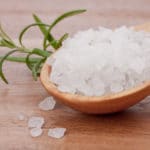
11 Mar Salt Awareness

‘More flavour, less salt’
How much salt should we be eating?
Adults (11 years plus) should be consuming no more than 6g of salt a day. This is the equivalent to one and a half teaspoons. Children ages 1 to 3 years should consume no more than 2g of salt a day. This is the equivalent of ½ a teaspoon. Children aged 4 to 6 should consume no more than 3g of salt a day, this is the same as ¾ of a teaspoon of salt. Children aged 7 to 10, should consume no more than 5g of salt a day, the equivalent to a heaped teaspoon. On average, adults consume 9 to 12g of salt a day, this is up to double the recommended amount.
Why do I need to follow these guidelines?
An increased salt diet can lead to high blood pressure, heart disease and stroke. Salt also causes dehydration which damages the kidneys.
What foods are high in salt?
Some foods are almost always high in salt because of the way they are made. Other foods, such as bread and breakfast cereals, can contribute a lot of salt to our diet. But that is not because these foods are always high in salt – it is because we eat a lot of them.
Many foods are high in salt without us knowing they are high in salt. These include, cheese, soup, bread, sausages, bacon, ketchup, mayonnaise, pasta sauce and stock!
What do I do to reduce my salt intake?
You can reduce salt intake by reducing consumption of high salt foods. Reducing salt in cooking is one of the easiest ways to reduce salt consumption. Replacing salt with chilli, citrus, fresh herbs, garlic, black pepper and spices allows for flavourful cooking.
Smart swaps are also another great sway to reduce salt. Replacing full salt products with reduced salt products reduces salt consumption without having to alter the diet too much.

Further information
Visit www.actiononsalt.org.uk for smart tips and tricks to reduce salt consumption. Or, visit the NHS website for facts on salt.
Healthyhearts.org.uk is taking part in ‘better health campaign’ and providing NHS weight support. If you wish to take part, apply now on the healthy hearts website.



Sorry, the comment form is closed at this time.